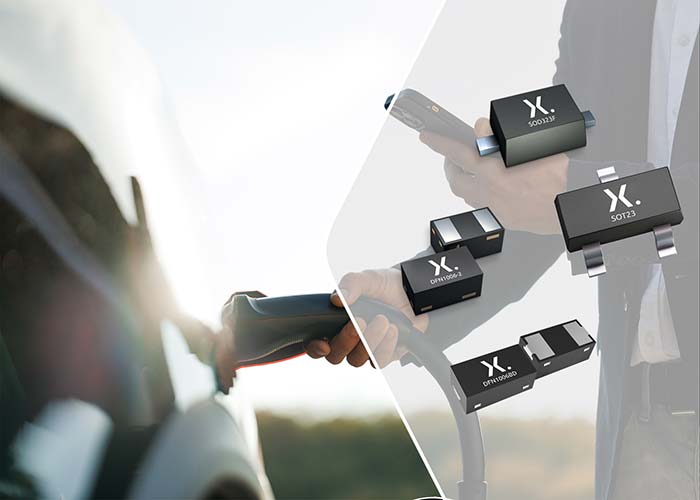 Nexperia today announced two enhancements to its extensive Zener diode portfolio that both eliminate undesirable overswing and noise behavior – making a major advancement in Zener technology. Firstly, the new 50 µA-Zener series with B-selection (Vz +/-2%) and Vz ranging from 1.8 V to 51 V is offered in standard and automotive qualified variants. Making them ideal for automotive applications like on-board chargers in electric vehicles (EV) as well as for a broad range of industrial and consumer applications like general-purpose computing units, battery management systems, device chargers and smartwatches.
Nexperia today announced two enhancements to its extensive Zener diode portfolio that both eliminate undesirable overswing and noise behavior – making a major advancement in Zener technology. Firstly, the new 50 µA-Zener series with B-selection (Vz +/-2%) and Vz ranging from 1.8 V to 51 V is offered in standard and automotive qualified variants. Making them ideal for automotive applications like on-board chargers in electric vehicles (EV) as well as for a broad range of industrial and consumer applications like general-purpose computing units, battery management systems, device chargers and smartwatches.
Nexperia’s new series of 50 µA devices now deliver full Zener functionality even at high voltages (up to 75 V). They have been designed to entirely eliminate the noise and overswing phenomena, common features of many Zener diodes that have previously led to application failures. These devices are available in small footprint packages including SOT23, SOD323, SOD523, and SOD123F as well as DFN1006BD-2 and DFN1006-2 with or without side-wettable flanks (SWF). The inclusion of SWF offers significant advantages, including highly reliable automated optical inspection (AOI) of solder joint quality and increased robustness of solder joints, enhancing the bond to the PCB compared to devices without SWF.
Furthermore, Nexperia also addresses overswing and noise concerns in their existing family of general-purpose PZU Zeners. This will provide engineers with greater flexibility for applications like supply voltage stabilization, comparison of sensor or supply voltages in addition to providing gate and avalanche breakdown protection for MOSFETs. The PZU family is available in SOD323, SOD323F, SOT23, DFN1006BD-2 and DFN1006-2 (2.4 V-51 V) packages, in both automotive and standard versions. Offering designers a viable alternative for critical applications that demand a sharper Zener ‘knee’, or where standard Zeners may show noise and overswing behavior.
Visit https://www.nexperia.com/zener to access product datasheets and learn more about Nexperia’s Zener diodes, including details on how the undesired overswing phenomena was eliminated.


